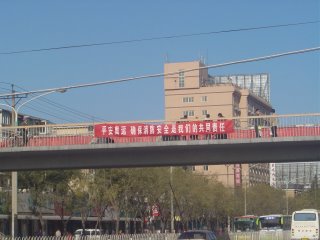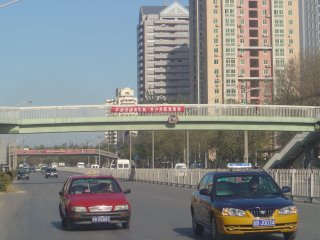Biao Yu (表 语)

"pingan aoyun quebao xiaofang anquan shi women de gontong zeren"
roughly: a safe and sound olympics, to ensure fire control, and safety is our common responsibility
Anybody out there interested in a Fullbright? I have the perfect topic for you! Biao Yus (roughly translated as (propagandistic/motivational/reminder banners). Biao Yus are uniquely Asian, specifically found, more or less, in China, Korea, and Japan. But nowhere as extensive or unique in their message as in China. If you walk around anywhere in China, you’ll soon notice these huge vermillion banners with white characters. They are blanketed everywhere, from campuses to freeway overpasses, used as street banners, and posted on guardrails, in buses, on walls facing streets, etc. In fact, what they say, and more important, why, is very interesting.
My time is severely constrained so I haven’t looked into these thoroughly, though I plan to when I get a break here soon….In any case, these Biao Yus effectively are reminders to the people to maintain a certain social order, to act according to some outlined principles. Some admonish people to be vigilant about thieves, others to keep the environment clean or respect rules in order to maintain order, how abiding by the one child policy is good for the country, etc. I’ve even seen one on a bus that said: Jin zhi fang pi! Farting is strictly forbidden!
Well, my project for the next seven months of my stay here in China will be to compare those of the city to those of the countryside. These undoubtedly are sponsored by the government in order to constantly remind people about maintaining social order and stability. I just wonder what it would be like to be constantly bombarded by these all your life. How they influence the subconscious, how those of the city differ in their message and goal from those of the countryside… They must have some unconscious affect; a Chinese friend concurred.
Even more interesting would be to use these as means to compare the three countries of Japan, China, and Korea. I asked my Korean and Japanese friends if the Chinese Biao Yus’ messages are similar and they said No, they are entirely different!
Now, this is a phenomenon entirely absent in the West. Could you imagine the government posting these banners constantly reminding you how to act in society? I asked my host sister about them, asking her if they are effective and why they are necessary, that in the West we don’t have them or need them. Her response: “How could you in the West not have them? How strange!” Thing is, the Chinese totally take them for granted. The city is so suffused with Biao Yus that they become something like a traffic sign per se. That is, you know what it says as well as its meaning but you only have to look at it and know. But it affects your actions….

"qian jia tong pu xiaofang qu, wan hu gong zhu xing fu lu"
roughly: a thousand households sing the song of 'fire control", ten thousand households together build a road of well-being.

